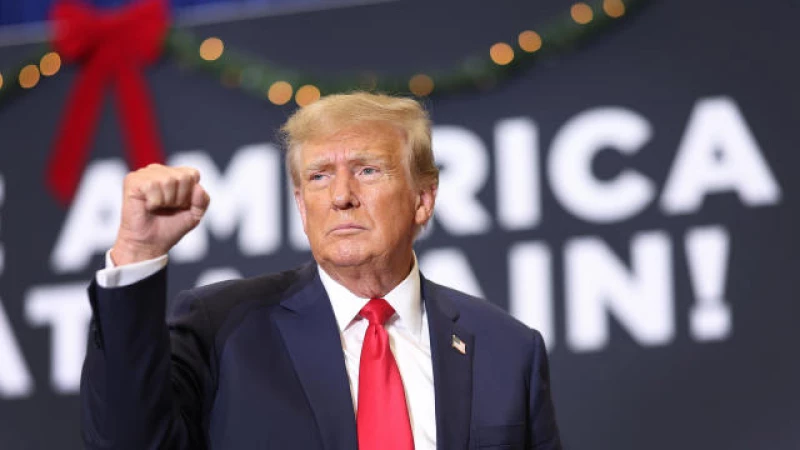Supreme Court Declines to Take Up Trump Immunity Case
Washington — The Supreme Court on Friday declined for now to take up a landmark case over whether former President Donald Trump is absolutely immune from prosecution for alleged crimes committed while he was in office, a move that allows the appeals process to play out first.
The court issued a one-line, unsigned order denying the request from special counsel Jack Smith: "The petition for a writ of certiorari before judgment is denied." There were no noted dissents.
The high court's decision paves the way for the U.S. Court of Appeals for the District of Columbia Circuit to rule first on whether the former president can be prosecuted for allegedly attempting to thwart the transfer of presidential power after the 2020 presidential election. The move does not preclude the losing party — Trump or Smith — from seeking the Supreme Court's review again after the appeals court makes its determination.
But it could impact the timing of the trial, which is set to begin March 4 in Washington, D.C. Proceedings in the case, one of two brought by Smith, have been paused while Trump pursues his appeal. Whether the prosecution of Trump can move forward hinges on the outcome of the dispute over his immunity claim. The special counsel's office declined to comment.
The decision is a blow to Smith and his team of prosecutors, who have pushed the courts to move quickly to hold trials in the Washington case and the second prosecution in Florida before the presidential election swings into full gear. Trump's attorneys, meanwhile, have urged the courts to delay the trials until after the election.
Trump's immunity claim
The latest dispute arrived at the nation's highest court on the heels of a decision from U.S. District Judge Tanya Chutkan, who rejected arguments from Trump's legal team that he is entitled to broad immunity from criminal prosecution for acts within the "outer perimeter" of his official duties.
In her Dec. 1 ruling, Chutkan found that the presidency "does not confer a lifelong 'get-out-of-jail-free' pass," and said Trump may be subject to "federal investigation, indictment, prosecution, conviction and punishment for any criminal acts undertaken while in office."
Trump was indicted on four counts in early August related to an alleged scheme to thwart the peaceful transfer of presidential power after the 2020 presidential election. He pleaded not guilty to all charges.
The Supreme Court is currently deliberating a case challenging the scope of a law that has been used to charge over 300 individuals, including former President Trump, for their alleged involvement in the January 6, 2021, attack on the U.S. Capitol. A decision from the justices is expected by the end of June.
Following Chutkan's denial of Trump's request to dismiss the charges based on immunity grounds, the former president sought a review of the decision from the D.C. Circuit. The appeals court has scheduled arguments for January 9. Subsequently, Trump turned to the Supreme Court, urging them to intervene before the appeals court makes a ruling.
"A fundamental principle of our constitutional order is that no individual is above the law. This principle holds particular weight when a grand jury accuses a former president of committing federal crimes to undermine the peaceful transfer of power to his duly elected successor," wrote Smith in his request to the justices. "There is nothing more crucial to our democracy than holding a president accountable for criminal conduct when they abuse the electoral system to remain in office."
The special counsel emphasized the "imperative public importance" of the Supreme Court resolving Trump's claims of immunity, and if rejected, proceeding with the trial "as promptly as possible." Smith has consistently stated that it is in the public interest for the March trial to proceed on schedule.
Trump's lawyers, however, had urged the Supreme Court not to decide the issue of his immunity until after the D.C. Circuit could examine the matter. They accused Smith of pursuing President Biden's partisan interests.
"The Special Counsel's extraordinary request, combined with its vague, threadbare justification, creates the compelling appearance of a partisan motivation: To ensure that President Trump — the leading Republican candidate for President, and the greatest electoral threat to President Biden — will face a months-long criminal trial at the height of his presidential campaign," the former president's legal team wrote.
They argued that in asking the Supreme Court to fast-track the case and leap-frog the appeals court, the special counsel was urging the justices to "rush to decide the issues with reckless abandon."
"An erroneous denial of a claim of presidential immunity from criminal prosecution for official acts warrants this Court's review — in due course," lawyers John Sauer, John Lauro and Todd Blanche wrote. "Yet importance does not automatically necessitate speed."







